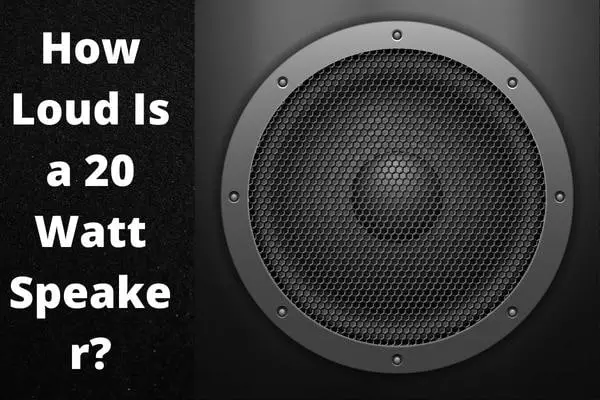
Most people have a pretty good understanding of how loud different sounds can be. For example, most people would say that a car horn is louder than a whispered conversation. So you have to know about How Loud Is a 20 Watt Speaker?
But when it comes to measuring sound, things can get a bit more complicated.
Sound is measured in units called decibels (dB). The higher the decibel level, the louder the sound. 0 dB is the threshold of human hearing, so anything above that can be heard by someone with normal hearing. Most speech is around 60 dB, while a car horn can be around 120 dB.
So what about a 20 watt speaker? Well, it turns out that the answer isn’t quite so simple. The loudness of a speaker depends on a number of factors, including its power rating, frequency response, and sensitivity. tweaked right, a 20 watt speaker can produce some pretty loud sounds.
- Are 20-Watt Speakers Loud?
- How Many Decibels Do 20-Watt Speakers Have?
- Decibel Levels Defined
- How Many Watts Should Loud Speakers Have?
- How Can You Say A 20-Watt Speaker Is a Good Quality?
- How Much Headroom You Have
- Level Of Speaker Impedance
- Total Harmonic Distortion or THD
- Kinds Of Speakers
- Loudspeakers
- Subwoofers
- In-wall/Ceiling Speakers
- Soundbars
- Conclusion
- Frequently Asked Questions
Are 20-Watt Speakers Loud?

A 10-watt speaker needs half as much power as a 20-watt speaker. But it can only make the sound louder by 3 decibels. So, sometimes a 20W speaker can be louder than a 10W speaker.
Even so, the speaker can’t play twice as loud, even though it uses a lot less power.
It’s important to keep in mind that how loud the speaker is will depend a lot on how well the amplifier and speaker work. In other words, your amp should always be able to give the speaker a little bit more than 20 watts.
The speaker’s sensitivity should also be high. If your speaker has a sensitivity of more than 90 decibels, it will work very well.
How Many Decibels Do 20-Watt Speakers Have?
Well, it depends on the brand and type of speaker. Some 20-watt speakers have a decibel rating as low as 80, while others have a rating of 100 or more. In general, though, you can expect 20-watt speakers to be on the lower end of the decibel scale. That means they won’t be as loud as some other types of speakers, but they should still be plenty loud for most purposes. If you need a speaker that is extra loud, you may want to consider a model with a higher wattage.
Using more than one 20-watt speaker is another option to increase the volume.
Overall, you can’t always expect 115.4 decibels from a 20-watt speaker.
Decibel Levels Defined
Sound levels are expressed in decibels (dB). Decibels are units used to measure sound volume. On a decibel scale, a ten-decibel increase means the volume is increased ten times. It’s important to keep this measure in mind when looking for a speaker for different purposes.
How Many Watts Should Loud Speakers Have?

The amount of power your speaker gives you has a direct effect on how loud and good the sound is, so you should think about the right wattage for your situation. If you like loud music that isn’t compressed, 20-watt speakers might not be enough for you.
At least, you should get speakers that are 90dB efficient and have 200 watts. At the same time, 20-watt speakers are enough if you want to listen to light classical and jazz music and don’t want it to shake the house.
This mostly affects you if you use high-efficiency speakers like horns, which use less power but sound better.
How Can You Say A 20-Watt Speaker Is a Good Quality?
Because the volume and sound quality of your 20-watt speakers depend on how efficient they are, you need to think about the following things when setting them up:
How Much Headroom You Have
When you’re choosing speakers, be sure to take headroom into account. If you have low headroom, you’ll want to choose smaller speakers that won’t take up too much space. If you have plenty of headroom, you can choose larger speakers that will give you a better sound.
Level Of Speaker Impedance
Speaker impedance is an important consideration when choosing speakers for your home audio system. Impedance is a measure of the speaker’s resistance to electrical current, and it is typically expressed in ohms. The lower the impedance, the easier it is for the speaker to draw power from the amplifier.
However, low-impedance speakers can also be more susceptible to noise and distortion. As a result, high-impedance speakers are often considered to be better quality. When choosing speakers, be sure to check the impedance rating to ensure that they will work with your amplifier.
Total Harmonic Distortion or THD
Many people have never heard of Total Harmonic Distortion (THD), but it is an important concept in the world of audio. THD is a measure of the distortion created when an audio signal is amplified. The higher the THD, the more distorted the sound will be.
In some cases, this distortion can be subtle, but it can also be very noticeable. In general, it is best to keep the THD as low as possible to avoid compromising the quality of the sound. There are many ways to reduce THD, and manufacturers often use a variety of methods to keep levels low.
However, it is important to remember that some degree of distortion is inevitable and that too much focus on reducing THD can result in a sterile-sounding audio experience.
Kinds Of Speakers
Speakers come in all shapes and sizes, from small, portable speakers that can be used with a phone or laptop to larger ones that are designed for home entertainment systems. The type of speaker you need will depend on the application.
Here are a few kinds of speakers and what they’re used for:
Loudspeakers

Loudspeakers are a vital part of any sound system, and they come in a variety of shapes and sizes to suit different needs. In general, loudspeakers can be divided into two main types: full-range and multi-way.
Full-range speakers contain all the necessary components to reproduce the full spectrum of sound, from bass to treble. Multi-way speakers, on the other hand, divide the frequency range into multiple bands and reproduce each band with a dedicated speaker. This allows for a more accurate reproduction of sound, but it also requires more careful setup and adjustment.
Subwoofers

A subwoofer is made to make sounds with low frequencies, which are usually below 200 Hz. Subwoofers, which are also known as bass speakers, are an important part of any sound system because they add the deep, rich bass that makes music and movies come to life.
In-wall/Ceiling Speakers

In-wall and in-ceiling speakers can provide superior sound quality compared to traditional floor-standing or bookshelf speakers, and they offer a number of additional benefits as well. Installation is quick and easy, and the speakers can be seamlessly integrated into your existing décor. In addition, in-wall and in-ceiling speakers are less likely to be damaged by pets or children.
Soundbars

A soundbar is an audio system that contains speakers in a single bar. A soundbar is typically used as part of a home theater system and can be mounted above or below a television. Soundbars usually have multiple channels and can produce surround sound. Some models also come with subwoofers for added bass.
Conclusion
In conclusion, a 20 watt speaker can reach a maximum volume of around 84 decibels. This is loud enough to cause temporary hearing loss if you are exposed to it for extended periods of time.
It is important to use caution when operating a 20 watt speaker and to keep the volume at a safe level. ambient noise levels in your environment. If you are seeking a louder speaker, you may want to consider a model with more wattage.
Frequently Asked Questions
Is the 20 W speaker loud?
There is only a 3 dB increase in sound pressure level with the 20-watt amplifier compared to the 10-watt amplifier. Because it takes an additional 10dB to sound “twice as loud,” even though a 20W amplifier will be significantly louder, it won’t be twice the volume.
So it all comes down to what you’re using the speaker for and the context in which you’re using it. For a small, closed space, 20 W speakers would be sufficient, but for a large, open area, a speaker with a higher wattage would be more prudent.
How many decibels are 20 watts?
A low-frequency speaker with a diameter of 10 inches (25cm) has an SPL of 80–87 decibels, while a tweeter has an SPL of 110–120 decibels. It depends on the speaker you have. You can’t just say that 20 watts equal 100 decibels.
Are 20 watts loud enough?
Although a 20-watt guitar amplifier is quite loud in comparison to other sounds, a band may not find it loud enough when they play for a crowd. This depends on what kind of situation you’re in and what you’re using the speaker for.
How many watts is a decent speaker?
Around 15 to 30 watts is the best for home-used speakers. Most homeowners think that 20 watts are enough. For bigger groups, a speaker with 50 or 100 watts of power may be used.






